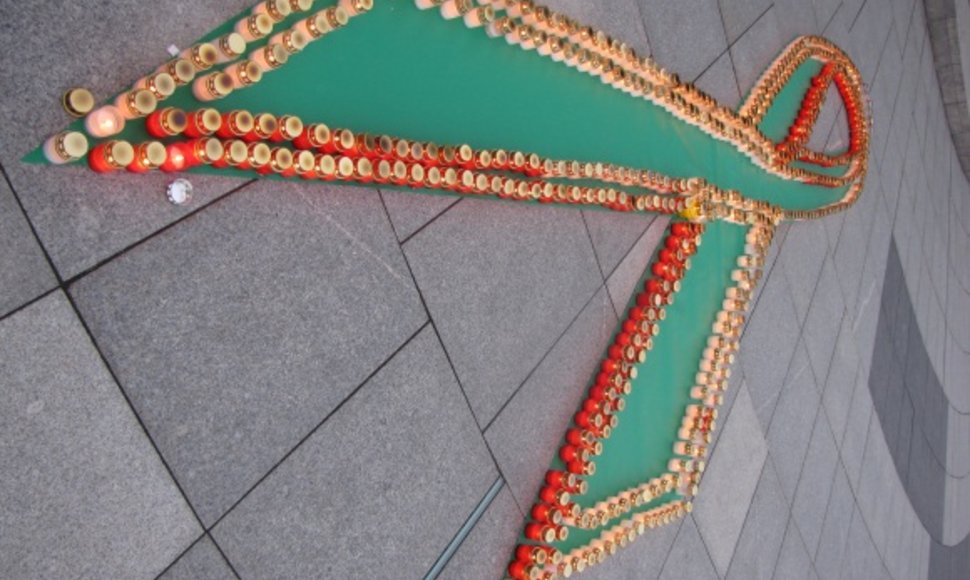Lithuania's Nephrologic Patients Association “Donorystė” spend a day in a drug store at a mall in Klaipėda explaining people how important a thing organ donation is. And asking if they knew how many people can be helped by one brain-dead donor. For those unfamiliar with the fact, the correct answer is: one donor can save or significantly improve lives of eight patients.
I must admit that what impressed me most was not the sheer pleasure of volunteer work (helping others of your personal charity and not for money) but certain revelations it brought me. One of them is the fact that we live in the dark.
To provide some context, in the United States, being a donor is no big feat, it is something taken for granted. Merely a mark in one's driver's license: a YES or a NO. So that, in worst-case scenario, after one dies prematurely, relatives do not need to trouble themselves with anything else except the funeral, without having to wonder: would s/he have wished to donate a liver/cornea/heart or not?
What do visitors of the big mall know about health-care and organ donation? The knowledge is usually limited to basic information one finds in flyers and ads. When I asked people if they wanted to become organ donors, only a dozen reacted sensibly, that is, knew what I was talking about. Only six agreed to fill in donor's card application, making their organs eligible (one cannot over-stress the fact: after the person is dead) to be transplanted.
The rest – vast majority of them – reacted somewhat tragicomically. Here are some instances.
Two young ladies. Initially showing interest, they suddenly became cautious: is it true that the state pays for you funeral, if you say yes? If not, they need to give it some more thought at home.
An emigrant. Having expressed his joy of not working in Lithuania, a young and seemingly daring man said point-blank: what's in it for me? I explained. The more people become donors, the bigger chance that you yourself will have your life saved by one of them. The man seemed impressed by the argument. He started filling in the application. But in mid-process, he froze: “You know, I'm getting cold feet. I'm afraid of death.” Upon these words, he stood up and went away, leaving the application half-finished.
A man who agreed to become a donor. One man, feeling perfectly at ease about giving away his organs on the way to the Creator (provided someone can make good use of them), sat down to fill in the application. But then his wife emerged from one of the shops and started shouting: “Are you out of your mind, what are you doing? Let's go home and discuss it.” After such a scene, the husband could only follow his wife home. Good for him. Maybe this will lead to an important discussion. Was this veritable emasculation, though, necessary?
A charming shopper in sable hat. Being offered a donor's card, a young, good-looking and manifestly affluent woman laughed: “I've already got a discount card, why would I care for another one?”
A number-conscious passerby. “How much is it? I have no money at the moment.”
A well-read citizen. “Are you kidding! So many people in Klaipėda get killed for their organs.”
A busy man. “I've already donated blood once, I don't have time now.”
Busting myths
Hearing that, I realized the situation. There is no need to moralize (about how one must see beyond shop windows and criminal news), just to explain.
A donor's card – and organ donation itself – is free. It documents one's will to help others once the organs are of no use to oneself anymore. Again – it only happens after one's death and if there is a recipient on the waiting list who could use one's “spare parts.” Certainly, there are cases in the world of people selling their organs on black market. But it has nothing to do with organ donation. The same applies to the criminal world. If people are killed in Lithuania, it is highly unlikely that the motive is a pair of kidneys. Matching organs with recipients is a highly complicated procedure that requires state-of-the-art laboratories.
It is a fact that, as yet, not a single donor's card owner in Lithuania has become an actual donor. Not one out of 15 thousand. Simply because most of them are still alive and kicking, while others did not have recipients for their organs.
In 2011, a total of 138 transplant surgeries were performed in Lithuania. Currently, there are 534 people on the waiting list in need of transplants.













